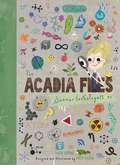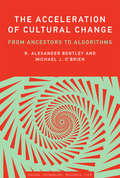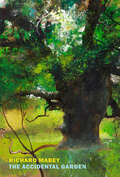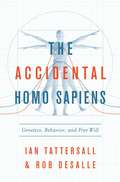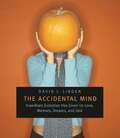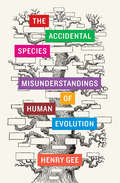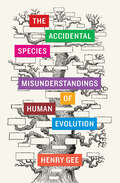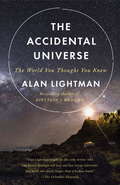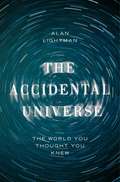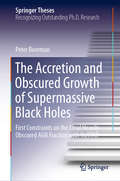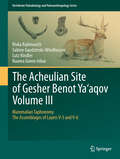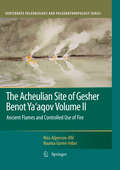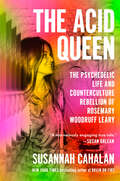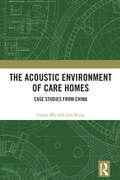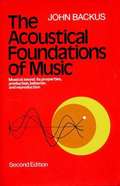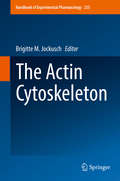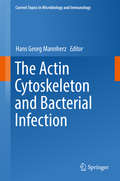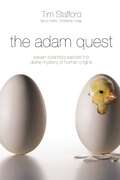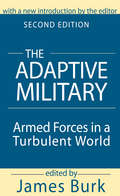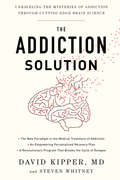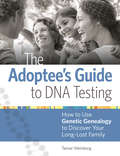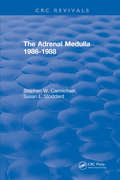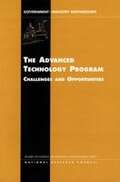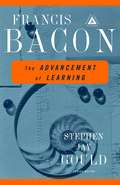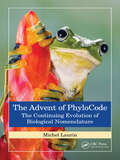- Table View
- List View
The Acadia Files: The Summer Investigations (The Acadia Files #1)
by Katie Coppens Holly HatamThe Acadia Files: Summer Investigations presents five summer stories, each one followed by Acadia’s science notebook pages with her simple explanations and lively, whimsical drawings of natural phenomena. The Acadia Files is a fun introduction to the wonders of science, using real-world scenarios to make scientific inquiry relatable and understandable. Parents and educators can use The Acadia Files to let kids discover for themselves what it’s like to be curious about the world and to satisfy that curiosity with scientific thinking. Acadia Files for autumn, winter, and spring will follow on future lists. The Acadia Files: Summer Investigations offers an engaging new way to apply the scientific method to real-world scenarios. Great for teaching STEAM Acadia Greene wants answers. Who keeps stealing her blueberries just as they ripen on the bushes? Why is her hair curly? Why does the sun wake her up so early in the summer? Why does the tide submerge her sandcastles? How do rocks become sand? Acadia doesn’t set out to do science, but she has these important questions and her scientist parents refuse to simply feed her the answers. “Conduct an experiment,” they tell her. “Use the scientific method.” So Acadia gathers evidence, makes hypotheses, designs experiments, uses the results to test her hypotheses, and draws conclusions. Acadia does science.
The Acceleration of Cultural Change: From Ancestors to Algorithms (Simplicity: Design, Technology, Business, Life)
by Michael J. O'Brien R. Alexander BentleyHow culture evolves through algorithms rather than knowledge inherited from ancestors. From our hunter-gatherer days, we humans evolved to be excellent throwers, chewers, and long-distance runners. We are highly social, crave Paleolithic snacks, and display some gendered difference resulting from mate selection. But we now find ourselves binge-viewing, texting while driving, and playing Minecraft. Only the collective acceleration of cultural and technological evolution explains this development. The evolutionary psychology of individuals—the drive for “food and sex”—explains some of our current habits, but our evolutionary success, Alex Bentley and Mike O'Brien explain, lies in our ability to learn cultural know-how and to teach it to the next generation. Today, we are following social media bots as much as we are learning from our ancestors. We are radically changing the way culture evolves.Bentley and O'Brien describe how the transmission of culture has become vast and instantaneous across an Internet of people and devices, after millennia of local ancestral knowledge that evolved slowly. Long-evolved cultural knowledge is aggressively discounted by online algorithms, which prioritize popularity and recency. If children are learning more from Minecraft than from tradition, this is a profound shift in cultural evolution. Bentley and O'Brien examine the broad and shallow model of cultural evolution seen today in the science of networks, prediction markets, and the explosion of digital information. They suggest that in the future, artificial intelligence could be put to work to solve the problem of information overload, learning to integrate concepts over the vast idea space of digitally stored information.
The Accidental Garden: Gardens, Wilderness, and the Space In Between
by Richard MabeyOne of Britain&’s greatest nature writers blends horticulture with philosophy in this intimate memoir about gardening, rewilding, and a path forward amid climate change.What is a garden? Is it an arena for the display of human mastery or might it be something less determined, more generous? These are questions that Richard Mabey, arguably England's greatest nature writer, considers in his new book, The Accidental Garden. From the pressing surrounds of the inventive, half-wild garden that Mabey, an instinctive rewilder, and his partner Polly, a determined grower, have shared for two decades, Mabey weighs past hopes and visions against the environmental emergency of the present. In beeches and bush crickets he sees proof of adaptation and survival; in commons and meadows he finds natural processes still at work. A wise and witty stylist, Mabey locates in his small patch of the planet a place to test assumptions and to observe how myriad species establish common ground.
The Accidental Homo Sapiens: Genetics, Behavior, And Free Will
by Ian Tattersall Robert DeSalleWhat happens now that human population has outpaced biological natural selection? Two leading scientists reveal how we became who we are—and what we might become. When you think of evolution, the picture that most likely comes to mind is a straight-forward progression, the iconic illustration of a primate morphing into a proud, upright human being. But in reality, random events have played huge roles in determining the evolutionary histories of everything from lions to lobsters to humans. However, random genetic novelties are most likely to become fixed in small populations. It is mathematically unlikely that this will happen in large ones. With our enormous, close-packed, and seemingly inexorably expanding population, humanity has fallen under the influence of the famous (or infamous) “bell curve.” Ian Tattersall and Rob DeSalle’s revelatory new book explores what the future of our species could hold, while simultaneously revealing what we didn’t become—and what we won’t become. A cognitively unique species, and our actions fall on a bell curve as well. Individual people may be saintly or evil; generous or grasping; narrow-minded or visionary. But any attempt to characterize our species must embrace all of its members and so all of these antitheses. It is possible not just for the species, but for a single individual to be all of these things—even in the same day. We all fall somewhere within the giant hyperspace of the human condition that these curves describe. The Accidental Homo Sapiens shows readers that though humanity now exists on this bell curve, we are far from a stagnant species. Tattersall and DeSalle reveal how biological evolution in modern humans has given way to a cultural dynamic that is unlike anything else the Earth has ever witnessed, and that will keep life interesting—perhaps sometimes too interesting—for as long as we exist on this planet.
The Accidental Mind
by David J. LindenLinden sets the record straight about the construction of the human brain; rather than the beautifully-engineered optimized device, the absolute pinnacle of design portrayed in many dumbed-down text books, pop-science tomes, and education televisions programs, Linden’s organ is a complicated assembly of cobbled-together functionality that created the mind as a by-product of ad-hoc solutions to questions of survival. His guided tour of the glorious amalgam of crummy parts includes pit-stops in the histories and fundamentals of neurology, neural-psychology, physiology, molecular and cellular biology, and genetics.
The Accidental Species: Misunderstandings of Human Evolution
by Henry GeeThe idea of a missing link between humanity and our animal ancestors predates evolution and popular science and actually has religious roots in the deist concept of the Great Chain of Being. Yet, the metaphor has lodged itself in the contemporary imagination, and new fossil discoveries are often hailed in headlines as revealing the elusive transitional step, the moment when we stopped being “animal” and started being “human. ” In The Accidental Species, Henry Gee, longtime paleontology editor at Nature, takes aim at this misleading notion, arguing that it reflects a profound misunderstanding of how evolution works and, when applied to the evolution of our own species, supports mistaken ideas about our own place in the universe. Gee presents a robust and stark challenge to our tendency to see ourselves as the acme of creation. Far from being a quirk of religious fundamentalism, human exceptionalism, Gee argues, is an error that also infects scientific thought. Touring the many features of human beings that have recurrently been used to distinguish us from the rest of the animal world, Gee shows that our evolutionary outcome is one possibility among many, one that owes more to chance than to an organized progression to supremacy. He starts with bipedality, which he shows could have arisen entirely by accident, as a by-product of sexual selection, moves on to technology, large brain size, intelligence, language, and, finally, sentience. He reveals each of these attributes to be alive and well throughout the animal world—they are not, indeed, unique to our species. The Accidental Species combines Gee’s firsthand experience on the editorial side of many incredible paleontological findings with healthy skepticism and humor to create a book that aims to overturn popular thinking on human evolution—the key is not what’s missing, but how we’re linked.
The Accidental Species: Misunderstandings of Human Evolution
by Henry Gee“With a delightfully irascible sense of humor, Henry Gee reflects on our origin . . . an excellent primer on how—and how not—to think about human evolution.” —Carl Zimmer, author of Parasite RexThe idea of a missing link between humanity and our animal ancestors predates evolution and popular science and actually has religious roots in the deist concept of the Great Chain of Being. Yet, the metaphor has lodged itself in the contemporary imagination, and new fossil discoveries are often hailed in headlines as revealing the elusive transitional step, the moment when we stopped being “animal” and started being “human.” In The Accidental Species, Henry Gee, longtime paleontology editor at Nature, takes aim at this misleading notion, arguing that it reflects a profound misunderstanding of how evolution works and, when applied to the evolution of our own species, supports mistaken ideas about our own place in the universe.Gee presents a robust and stark challenge to our tendency to see ourselves as the acme of creation. Far from being a quirk of religious fundamentalism, human exceptionalism, Gee argues, is an error that also infects scientific thought. Touring the many features of human beings that have recurrently been used to distinguish us from the rest of the animal world, Gee shows that our evolutionary outcome is one possibility among many, one that owes more to chance than to an organized progression to supremacy. He starts with bipedality, which he shows could have arisen entirely by accident, as a by-product of sexual selection, then moves on to technology, large brain size, intelligence, language, and, finally, sentience. He reveals each of these attributes to be alive and well throughout the animal world—they are not, indeed, unique to our species.The Accidental Species combines Gee’s expertise and experience with healthy skepticism and humor to create a book that aims to overturn popular thinking on human evolution. The key is not what’s missing—but how we’re linked.
The Accidental Universe
by Alan Lightman"Alan Lightman brings a light touch to heavy questions. Here is a book about nesting ospreys, multiple universes, atheism, spiritualism, and the arrow of time. Throughout, Lightman takes us back and forth between ordinary occurrences--old shoes and entropy, sailing far out at sea and the infinite expanse of space. "In this slight volume, Lightman looks toward the universe and captures aspects of it in a series of beautifully written essays, each offering a glimpse at the whole from a different perspective: here time, there symmetry, not least God. It is a meditation by a remarkable humanist-physicist, a book worth reading by anyone entranced by big ideas grounded in the physical world."--Peter L. Galison, Joseph Pellegrino University Professor, Harvard Universityly a tiny piece of the extraordinary, perhaps unfathomable whole.
The Accidental Universe: The World You Thought You Knew
by Alan LightmanIn The Accidental Universe, physicist and novelist Alan Lightman explores the emotional and philosophical questions raised by discoveries in science, focusing most intently on the human condition and the needs of humankind.Here, in a collection of exhilarating essays, Lightman shows us our own universe from a series of fascinating and diverse perspectives. He takes on the difficult dialogue between science and religion; the conflict between our human desire for permanence and the impermanence of nature; the possibility that our universe is simply an accident; the manner in which modern technology has divorced us from enjoying a direct experience of the world; and our resistance to the view that our bodies and minds can be explained by scientific logic and laws alone.With his customary passion, precision, lyricism and imagination, in The Accidental Universe Alan Lightman leaves us with the suggestion - heady and humbling - that what we see and understand of the world and ourselves is only a tiny piece of the extraordinary, perhaps unfathomable whole.Praise for Alan Lightman:'...a gem of a novel that is strange witty erudite and alive with Lightman's playful genius.' Junot Diaz.'It would not seem possible for Alan Lightman to match his earlier tour de force, Einstein's Dreams, but in Mr g he has done so - with wit, imagination, and transcendent beauty.' Anita Desai.
The Accretion and Obscured Growth of Supermassive Black Holes: First Constraints on the Local Heavily Obscured AGN Fraction with NuSTAR (Springer Theses)
by Peter BoormanThis thesis describes the application of state-of-the-art high-energy X-ray studies to the astronomical quest for understanding obscured active galactic nuclei (AGN). These AGN are supermassive black holes growing by accretion of matter located in the nuclei of galaxies. The material that feeds these black holes also obscures them from view, rendering them challenging to study. It is possible to study them by effectively 'X-raying' galactic nuclei to peer through these obscuring veils. Beginning with the proof-of-concept application of novel X-ray Monte Carlo codes to the Nuclear Spectroscopic Telescope ARray (NuSTAR) spectrum of a known heavily obscured AGN, the thesis establishes the relevant parameters that characterise the AGN spectrum and central black hole growth rate. Next the largest sample of known heavily obscured AGN is compiled, finding the strength of a prominent iron spectral feature to weaken with AGN power. This is puzzling, and suggests that there may be more hidden AGN than previously thought. Finally by combining an all-sky infrared selection with NuSTAR follow-up, new heavily obscured AGN are identified. Obscuration emits infrared radiation, meaning that the infrared-selected AGN catalogue should be representative of the underlying AGN population. The absence of such representative catalogues has continually plagued cosmological studies, and the resultant obscured AGN fraction will be strongly constraining for AGN models.
The Acheulian Site of Gesher Benot Ya‘aqov Volume III
by Naama Goren-Inbar Lutz Kindler Rivka Rabinovich Sabine Gaudzinski-WindheuserMultidisciplinary research on the Early-Middle Pleistocene site of Gesher Benot Ya'aqov has yielded abundant climatic, environmental, ecological and behavioral records. The 15 archaeological horizons form a sequence of Acheulian occupational episodes on the shore of the paleo-Lake Hula. These enable us to reconstruct numerous aspects of the survival and adaptation of ancient hominins, leading to a better understanding of their evolution and behavior. This book presents the faunal analyses of medium-sized and large mammals, providing taxonomic, taphonomic and actualistic data for the largest faunal assemblages. The study of modes of animal exploitation reveals valuable information on hominin behavior.
The Acheulian Site of Gesher Benot Ya’aqov Volume II
by Naama Goren-Inbar Nira Alperson-AfilThe manipulation of fire by early hominins was a turning point in our evolutionary history. Once "domesticated", fire provided warmth, light and protection from predators, as well as enabling the exploitation of a new range of foods. This book presents the spatial analyses of burned and unburned flint items which provide evidence for the controlled use of fire at the 790,000-year-old Acheulian site of Gesher Benot Ya'aqov (GBY). Clusters of burned flint, interpreted as the remnants of hearths, occur throughout the entire occupational sequence of the site. The fact that fire is repetitively used suggests that the knowledge of fire-making and the technological skills of the Acheulian hominins of Gesher Benot Ya'aqov enabled them to set fire at will in diverse environmental settings. "Control of fire marks a significant landmark in human evolution, providing warmth, protection, and many new foods. This important volume compellingly shows that fire was already in regular use some 800,000 years ago." John D. Speth, Museum of Anthropology, University of Michigan, Ann Arbor, USA "A major contribution to knowledge of early human fire history, the finds at Gesher Benot Ya'aqov add immensely to the picture of our early ancestors by the fireside. The authors present a painstaking and multidimensional scientific investigation which should convince even sceptics of the importance of fire use in prehistory" John A.J. Gowlett, British Academy Centenary Research Project, The Archaeology of the Social Brain, UK.
The Acid Queen: The Psychedelic Life and Counterculture Rebellion of Rosemary Woodruff Leary
by Susannah Cahalan&“Shines a light on one of the twentieth century&’s most amazing untold life stories. ... An essential read—and an unforgettable trip.&” —Robert Kolker, author of Hidden Valley Road &“Cahalan details a piece of lost but fascinating history, the story of a woman who embodied an era of freedom, experimentation, and psychedelic adventure. Meticulously reported and beautifully crafted.&” —Susan OrleanThe untold story of the woman who played a critical role in bringing psychedelics into the mainstream—until her audacious exploits forced her into the shadows—from the #1 New York Times bestselling author of Brain on FireRosemary Woodruff Leary has been known only as the wife of Timothy Leary, the Harvard professor-turned-psychedelic high priest, whose jailbreak captivated the counterculture and whose life on the run with Rosemary inflamed the government. But Rosemary was more than a mere accessory. She was a beatnik, a psychonaut, and a true believer who tested the limits of her mind and the expectations for women of her time.Long overlooked by those who have venerated her husband, Rosemary spent her life on the forefront of the counterculture, working with Leary on his books and speeches, sewing his clothing, and shaping—for better and for worse—the media&’s narrative about LSD. Ultimately, Rosemary sacrificed everything for the safety of her fellow psychedelic pioneers and the preservation of her husband&’s legacy.Drawing from a wealth of interviews, diaries, archives, and unpublished sources, Susannah Cahalan writes the definitive portrait of Rosemary Woodruff Leary, reclaiming her narrative and her voice from those who dismissed her. Page-turning, revelatory, and utterly compelling, The Acid Queen shines an overdue spotlight on a pioneering psychedelic seeker.
The Acoustic Environment of Care Homes: Case Studies from China
by Jian Kang Jingyi MuThis book examines the indoor acoustic environment of China's care homes. Chapter 1 provides a brief introduction to the current situation in China's care homes. This includes the distribution, size, demand, and future development direction of these facilities. The chapter then presents an in-depth introduction and analysis of the indoor environment of these facilities, especially the acoustic environment. In Chapter 2, a case study and site investigation are described, and these are used to analyse the current state of the acoustic environment in these facilities, including the sound pressure level (SPL) and reverberation time (RT). Chapter 3 details the perceptions of the elderly regarding the acoustic environment of care homes and the correlation between the sound environment and other physical environments at the facilities. Chapter 4 presents the impact of the acoustic environment on the well-being of elderly residents and an analysis of the effects of different sound sources on the activities of the elderly. The effects of the acoustic environment on physiological indices of the elderly under different sound sources in care homes are analysed in Chapter 5. Finally, in Chapter 6, certain improvement strategies for the indoor acoustic environment of care homes are proposed based on the analysis. This book is a comprehensive exposition of research on the acoustic environment of care homes in China, and is useful reading for researchers in acoustics, architecture, design, engineering, and healthcare facilities. It could also be used as a scientific introduction for readers interested in this field.
The Acoustical Foundations of Music (2nd edition)
by John BackusThe original purpose of Professor Backus's book was to collect and organize the scattered results of research, past and present, in the areas of scientific knowledge that are relevant to music: the physiological properties of sounds; the effect of acoustical environment; the acoustical behavior of musical instruments; and the various applications of electronics and computers to the production, reproduction, and composition of music. The aims and organization of the second edition remain the same; the results are more complete and up-to-date.
The Actin Cytoskeleton
by Brigitte M. JockuschActin is one of the most abundant proteins and ubiquitously expressed in all eukaryotes. In recent years, the analysis of structure and function of such complexes has shed new light on actin's role in cellular and tissue morphogenesis, locomotion and various forms of intracellular motility, but also on its role in nuclear processes like chromatin architecture and transcription. Progress in understanding these different physiological phenomena, but also in unravelling the basis of actin-based pathophysiological processes has been made by combining video microscopy, molecular biology, genetics and biochemistry. Thus, the current research on actin, as ongoing in many international laboratories, is a "hot spot" in basic and translational research in life sciences. In this book on "The Actin Cytoskeleton", twelve internationally renowned authors present specific chapters that cover their recent work concerned with the various roles of actin mentioned above. This comprehensive volume is therefore an attractive handbook for teachers and students in many fields of medicine and pharmacology.
The Actin Cytoskeleton and Bacterial Infection
by Hans Georg MannherzThis volume describes the mechanisms which bacteria have created to secure their survival, proliferation and dissemination by subverting the actin cytoskeleton of host cells. Bacteria have developed a veritable arsenal of toxins, effector proteins and virulence factors that allow them to modify the properties of the intracellular actin cytoskeleton for their own purposes. Bacterial factors either modify actin directly as the main component of this part of the cytoskeleton or functionally subvert regulatory or signalling proteins terminating at the actin cytoskeleton. In short, this volume provides an overview of the various tricks bacteria have evolved to "act on actin" in order to hijack this essential host cell component for their own needs. As such, it will be of interest to scientists from many fields, as well as clinicians whose work involves infectious diseases.
The Adam Quest: Eleven Scientists Who Held on to a Strong Faith While Wrestling with the Mystery of Human Origins
by Tim StaffordScience and faith should be allies, not opponents, in the search for truth.But when it comes to understanding the very beginnings of life, it is no easy task to reconcile the history taught in the Bible with the discoveries of the scientific community.Author Tim Stafford watched the tension between the beliefs of Darwin and the teaching of Genesis shake the faith of his family, ruin friendships, and leave Christians in the field of science feeling as though the doors of the church were closed to their profession.He believes this civil war can stop. The scientific record and the truth of the Bible aren&’t mutually exclusive. The Adam Quest offers a compelling new look at the beginnings of life as Stafford puts questions of dinosaurs, genealogy, and the age of the earth to eleven world-class scientists.A sweeping book—touching everything from advances in genetics to a particle physicist striving to become Anglican priest—Stafford uses the stories and journeys of these remarkable men and women to provide a new diversity of answers. Scientific progress is carefully detailed, while the struggle toward truth and toward God is humanized.A deeply informative look at Christians working in science, this book is for both believers and those who harbor doubts—an intersection of faith and science, and a safe place for questions. Whether you believe in a young earth, intelligent design, evolutionary creationism, or something else, The Adam Quest offers a chance to strengthen your faith, deepen your knowledge, and bring science back into the church.Praise for The Adam Quest&“To a debate that usually provokes accusations, name-calling, and polarization, Tim Stafford offers a wise, mediating overview. For some, this book may well be a faith-saver.&”—Philip Yancey, author of What Good Is God?&“If you&’ve ever been troubled by the relationship between science, the Bible, and human origins—this book is for you. Tim is thoughtful of mind and generous of spirit—two qualities much needed in this discussion.&”—John Ortberg, Senior Pastor of Menlo Park Presbyterian Church, and author of Who Is This Man?&“Tim Stafford provides a glimpse into the lives of eleven scientists with a strong commitment to Christian faith who are involved in the creation/evolution controversies, representing different perspectives. He goes beyond the technical details of the debates to reveal the personal experiences that underlie each of their convictions. Everyone interested in science and faith would benefit from this insightful perspective of the human sentiment behind the wide range of positions.&”—Randy Isaac, Executive Director, American Scientific Affiliation&“The importance of Stafford&’s book is that it brings together the top advocates of the various creation positions and lets them speak for themselves. The personal stories put a human face on a debate that has split Christians from Christians, as well as Christians from non-Christians. I found the discussion of the personal histories of each author as important as the technical positions they defend. This is as much a book about the sociology of science as the details of creation. It lays out how science advances, how Christians practice their faith in their discipline, and how the science establishment responds to propositions that are not in the mainstream.&”—Robert K. Prud'homme, Professor of Chemical and Biological Engineering; Director, Program in Engineering Biology at Princeton University
The Adaptive Military: Armed Forces in a Turbulent World
by Peter Jordan Caroline LloydWhen the cold war ended, many hoped it signified enhanced prospects for a more stable world. However, despite favorable political developments, the post-cold war period has been marked by turbulence, uncertainty, and challenge. The actions of rogue states such as Iraq and North Korea have made nuclear proliferation more unpredictable. Violence in Somalia and Bosnia has cast doubt on the viability of international peacekeeping arrangements. Hopes for expanding democratization have been dimmed by assertions that the values of liberal democracy and human rights are incompatible with non-Western cultures. The Adaptive Military describes how military security policies and practices have adapted to these new times and explains why such changes are necessary.The central argument is that current conflicts have been shaped by long-term trends, which increased the number and complexity of threats that the developed world is supposed to meet, and correspondingly decreased the stock of social and political options available to meet them.Although the authors differ in their assessments about the current prospects for peace and ways to maintain security, the issues they address are as critical as they were at the end of the Cold War. Mobilizing resources and political support for remote and difficult enterprises will always remain contentious, but if we recognize the hazard of letting violence run unopposed throughout the world, then we bear some responsibility to consider how it might be checked. This volume is an exercise of that responsibility. It will be of great interest to experts in military studies and international relations.
The Addiction Solution: Unraveling the Mysteries of Addiction through Cutting-Edge Brain Science
by David Kipper Steven WhitneyA revolutionary and empowering paradigm in treating addiction based on groundbreaking new science.For decades addiction has been viewed and treated as a social and behavioral illness, afflicting people of "weak" character and "bad" moral fiber. However, recent breakthroughs in genetic technology have enabled doctors, for the first time, to correctly diagnose the disease and prove that addiction is an inherited, neuro-chemical disease originating in brain chemistry, determined by genetics, and triggered by stress.In their groundbreaking The Addiction Solution, David Kipper, MD, and Steven Whitney distill these exciting findings into a guide for the millions of adults who want to be free from the cycle of addiction, and for their loved ones who want to better understand it and to help. It draws on composite case histories to illustrate how the innovative Personal Recovery Program works by customizing treatment for a diverse group of addicts abusing a wide variety of different substances—from the first day of treatment to its successful resolution. The result is a complete guide to a world made brand-new by this enormous paradigm shift in the treatment of addiction.
The Adoptee's Guide to DNA Testing: How to Use Genetic Genealogy to Discover Your Long-Lost Family
by Tamar WeinbergReconnect with your roots! Adoptees, foundlings, and others with unknown parentage face unique challenges in researching their ancestors. Enter this book: a comprehensive guide to adoption genealogy that has the resources you need to find your family through genetic testing. Inside, you'll find:Strategies for connecting your genealogy to previous genealogistsDetailed guides for using DNA tests and tools, plus how to analyze your test results and apply them to researchReal-life success stories that put the book's techniques into practice and inspire you to seek your own discoveries
The Adrenal Medulla 1986-1988 (CRC Press Revivals)
by Stephen W. CarmichaelThis volume provides a complete review of all the articles which have appeared in the literature since 1986 that pertain to the adrenal medulla and adrenal chromaffin. Over 1700 articles are reviewed, organized, and summarized. Topics covered include the transplantation of medulla into the brain, stimulus-secretion coupling, neuropeptides, enzymes of catecholamine biosynthesis, growth factors, neural regulation and clinical considerations, including imaging and tumors. This book will provide interesting reading for neurobiologists, cell biologists, pathologists, diagnostic radiologists, and advanced biology students.
The Advanced Technology Program: Challenges and Opportunities
by National Research Council Technology Board On Science Economic PolicyThe National Academies Press (NAP)--publisher for the National Academies--publishes more than 200 books a year offering the most authoritative views, definitive information, and groundbreaking recommendations on a wide range of topics in science, engineering, and health. Our books are unique in that they are authored by the nation's leading experts in every scientific field.
The Advancement of Learning (Modern Library Science)
by Francis BaconFrancis Bacon, lawyer, statesman, and philosopher, remains one of the most effectual thinkers in European intellectual history. We can trace his influence from Kant in the 1700s to Darwin a century later. The Advancement of Learning, first published in 1605, contains an unprecedented and thorough systematization of the whole range of human knowledge. Bacon's argument that the sciences should move away from divine philosophy and embrace empirical observation would forever change the way philosophers and natural scientists interpret their world.
The Advent of PhyloCode: The Continuing Evolution of Biological Nomenclature
by Michel LaurinBiological nomenclature is an essential tool for storing and retrieving biological information. Yet traditional nomenclature poorly reflects evolutionary theory. Current biological nomenclature is one of the few fields promoting deliberately vague usage of technical terms. A new code based on evolutionary studies and phylogenetic results (the PhyloCode) will be a major milestone in biological nomenclature. Unfortunately, The PhyloCode and the companion volume are highly technical publications intended for practicing systematists. This book will reach a broader readership of those using nomenclature but who remain unaware of its theoretical foundations.Key Features Responds to the biodiversity crisis and the recent implementation of the PhyloCode Summarizes the spectacular progress of phylogenetics which makes it both increasingly easy and crucially important to define precisely taxon names Provides a 300-year historical perspective featuring high-profile characters, such as Linnaeus and Darwin Summarizes for a broad readership a widely scattered, highly technical and underappreciated scientific literature Documents the activities of the International Society for Phylogenetic Nomenclature, a scholarly society in which the author has played a prominent role
